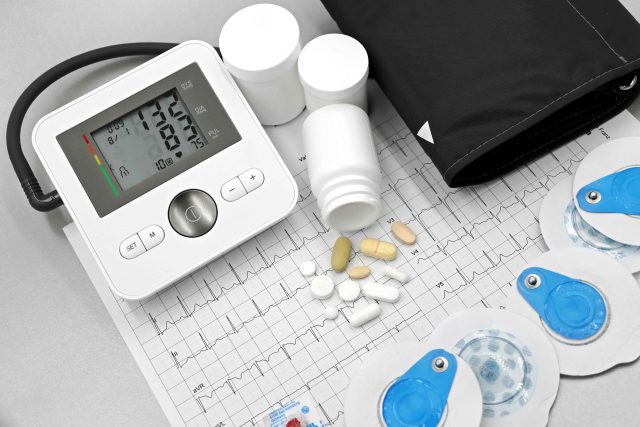Introduction: That Moment of Doubt
You’re sitting in the clinic. The nurse checks your blood pressure.
“120/80,” she says. Perfect.
You smile. Finally. After months, maybe even years, your BP is normal.
A thought sneaks in: Do I really need these pills anymore?
Seems fair, right? If the numbers are fine, why continue?
But here’s the thing—high blood pressure (or hypertension) is sneaky. It doesn’t shout. It whispers. And stopping your meds just because the numbers look good… that’s where things get risky.
Let’s walk through the whole picture. Together.
What Exactly is High Blood Pressure?
Hypertension means your blood is pushing too hard against the artery walls. Over time, that pressure damages them. Like water slowly cracking a pipe.
You don’t always feel it. That’s why it’s called the silent killer.
Two Key Numbers:
- Systolic (top number): Pressure during a heartbeat
- Diastolic (bottom number): Pressure between heartbeats
Normal is around 120/80 mmHg. If it consistently stays above 130/80, that’s hypertension.
But it’s more than just numbers. It’s about long-term health.
Why Is Your BP Normal Now?
Here’s the truth: It’s most likely normal because you’re taking medication.
Blood pressure meds don’t cure hypertension. They control it. Like brakes in a car—you don’t stop needing brakes just because you’re not speeding.
The medicine is doing its job. That’s why the numbers are down.
Stopping meds? That’s like letting go of the wheel because the car is driving straight.
How BP Medicines Work
Different meds work in different ways. But they all aim for one thing: lower the pressure.
Common Types:
- ACE inhibitors (like enalapril): Relax blood vessels
- Beta-blockers (like atenolol): Slow down the heart
- Diuretics (like hydrochlorothiazide): Help your body lose excess salt and water
- Calcium channel blockers (like amlodipine): Prevent arteries from tightening
Each one plays a role. Some people need one. Others, a combo. It depends.
So, Can You Ever Stop Taking Them?
Short answer? Maybe. But only with caution. And with your doctor’s full support.
Factors That Matter:
- How long have you had hypertension?
- What caused it? Lifestyle? Genetics? Kidney issues?
- Have you changed your diet and exercise routine?
- Any history of stroke, heart disease, or diabetes?
If your blood pressure has been stable for months and you’ve made big lifestyle changes, your doctor may consider reducing your dose. Or even stopping it.
But it must be gradual. Supervised. Monitored.
You can’t cold-turkey these meds. That can backfire.
The Danger of Stopping Suddenly
Let’s talk consequences.
What Could Happen:
- BP rebounds. Suddenly. Sometimes worse than before.
- Risk of stroke increases.
- Chest pain or heart attack. Especially if you were on beta-blockers.
I once had a patient—Mr. Ahmed. In his 50s. BP under control. He felt good. Decided to stop meds without telling anyone.
Two weeks later? He ended up in the ER with a mini-stroke. Luckily, he recovered. But not everyone’s that lucky.
How to Know If You’re Ready to Stop
This is not about “feeling fine.” It’s about the whole picture.
Work closely with your doctor or pharmacist. They might try what’s called a medication taper. That means slowly reducing the dose, one step at a time.
Meanwhile:
- Check your BP at home (daily)
- Keep a log
- Watch for symptoms: headaches, dizziness, chest pain, nosebleeds
If BP stays stable for months, medication may be adjusted. Or in some rare cases, stopped.
But the key? Supervision.
Lifestyle: The Game-Changer
Sometimes, lifestyle alone can lower BP.
What Helps:
- Losing weight (even 5-10 pounds matters)
- Regular exercise (30 mins, 5x a week)
- Low-sodium diet (DASH diet is gold)
- Quitting smoking
- Limiting alcohol
- Managing stress
When combined with meds, this can normalize BP. And maybe, just maybe, reduce the need for pills.
But don’t try it alone. It’s a team effort.
Long-Term Strategy
Hypertension is a chronic condition. Even if BP is normal today, there’s always a risk it can rise again.
Your plan should include:
- Routine check-ups
- Annual heart exams
- Kidney function monitoring
- Eye check-ups (yes, BP affects the eyes too!)
Think of it as car maintenance. Don’t wait for smoke to check the engine.
Common Myths (Busted!)
Myth 1: “I don’t feel anything, so I’m fine.”
Truth: Most people with high BP feel nothing. Until it’s too late.
Myth 2: “I can stop meds once BP is normal.”
Truth: The meds caused it to become normal. Stopping may reverse that.
Myth 3: “Natural remedies are enough.”
Truth: They help. But not always enough on their own.
Real-Life Stories
Sara, age 42, started walking daily and lost 8 kg. Her doctor reduced one of her meds after 8 months of stable BP.
Yusuf, age 60, stopped meds on his own. His BP spiked to 180/110. He now takes two medications instead of one.
Zahra, age 35, used to have pregnancy-related hypertension. Post-delivery, her BP normalized and meds were stopped gradually under supervision.
Every story is different. That’s why it’s never a one-size-fits-all.
Final Thoughts
Can you stop BP medicine if your numbers are normal?
Sometimes. But never on your own.
BP medications are long-term tools. Not forever for everyone, but often for many.
Work with your doctor. Make lifestyle changes. Monitor your health.
And remember—normal numbers don’t mean you’re cured. They mean you’re doing something right.
Keep doing it.
FAQs
Q: Can I stop my BP meds if I lose weight?
A: Possibly. Weight loss can lower BP, but any medication changes should be made by your doctor.
Q: What are the signs my BP is going up again?
A: Headache, dizziness, blurry vision, chest pain, and nosebleeds.
Q: Are BP meds forever?
A: Not always. Some people reduce or stop meds after major lifestyle changes—but under supervision.
Q: How fast does BP rise after stopping meds?
A: It varies. Sometimes within days. Sometimes weeks. It can spike quickly and silently.
Q: Is there a natural alternative?
A: Lifestyle is the best natural tool. But in many cases, it’s not enough alone.
Q: Can I take a break from meds on weekends?
A: No. Skipping doses causes instability and increases risk.
Closing Words
Take care of your heart.
Your brain. Your kidneys.
And take care of your decisions.
Stopping your BP medicine might feel tempting. But don’t do it alone.
Let your pharmacist and physician guide the way.
Your health’s worth it.









